The Kabul restaurant preserving the teapot stew tradition
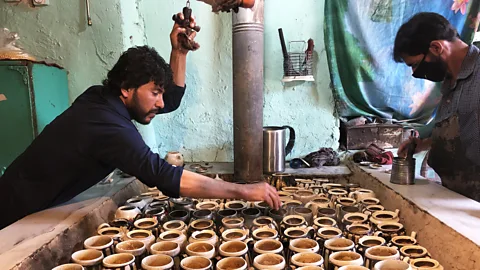 Kanika Gupta
Kanika GuptaThrough decades of conflict, two generations of chefs have served hungry customers this lamb dish cooked in colourful teapots.
Kabul's vibrant bird market, Ka Faroshi, lies in the heart of the old city. Framed by brown mud houses, the market's riot of colours erupts from the yellow of canaries, neon green of parrots and turquoise of budanas (a lark-like bird) all fluttering within bell-shaped wicker cages. The melody of birdsong guides shoppers deeper into the labyrinth of stalls that line the market's narrow alleyways.
Beyond the cages and crowds, tucked between crumbling buildings, sits Kabul's oldest restaurant, a spot that has been serving chainaki, a traditional lamb stew, for nearly 70 years. Bacha Broot occupies one of the market's few remaining original structures, the others long ago destroyed by war and Soviet invasion. In this sea of people and dilapidated buildings, it would be easy to miss this tucked-away traditional chaykhana (teahouse) if it wasn't for the heady aroma of a simmering stew that beckons customers up the crumbling staircase.
Inside, the rich scent of oil and cooked lamb hangs heavy in the air. Chipped wooden tables and chairs that sag under the weight of time speak volumes about the crowds to which Bacha Broot has served its famous comfort food over the years. Its sparse interior and general state of disrepair illustrate the restaurant's single-minded goal of serving the best traditional chainaki.
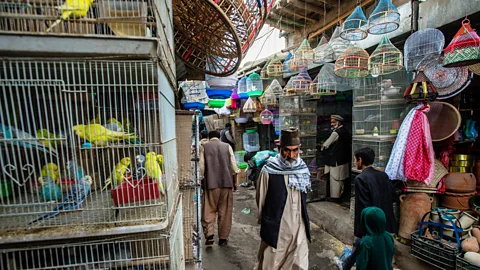 Oleksandr Rupeta/Alamy
Oleksandr Rupeta/AlamyBacha Broot, meaning "boy with a moustache" in Dari, is a single-dish restaurant that serves authentic chainaki cooked in the traditional way, in individual chainak (clay teapots). The founder of the restaurant, Mir Mirza, was a chainaki pazir (someone who specialises in chainaki) famous for his big moustache and rich chainaki. Current owner Wahidullah Bacha Broot, son of Mir Mirza, still offers customers the rare chance to eat chainaki in this traditional way.
Helen Saberi, food historian and author of Noshe Djan: Afghan Food and Cookery, notes the importance of chaykhanas that serve tea and simple traditional meals. "They are found all over the country where weary travellers can obtain refreshments after long and dusty journeys," she wrote in her book, Teatimes. "They are also the meeting place for the locals (men) to meet and exchange news and gossip."
Wahidullah prepares his traditional chainaki nearly each day, carefully following the family recipe to maintain the reputation his father worked for years to build. Coming from Panjshir province in the north-eastern part of the country, the elder Bacha Broot had humble beginnings as an illiterate man with no source of income. He was, however, an expert in making chainaki. He opened the restaurant more than seven decades ago and soon became famous for his teapot stew.
The ingredients are important, but when it comes to authentic chainaki, it all comes down to the clay teapot. "A lot of people in Afghanistan have started using different pots for preparing chainaki. If you make it in an ordinary dish, it becomes shorwa," said Wahidullah, noting that the clay teapot is what gives the thick lamb stew its distinct taste and smell. Bacha Broot's kitchen surface is covered with colourful rows of chainaki teapots, all simmering with their precious delicacy and kept hot by coal embers beneath. Tea, which is prepared in a separate vessel, can be requested alongside the meal.
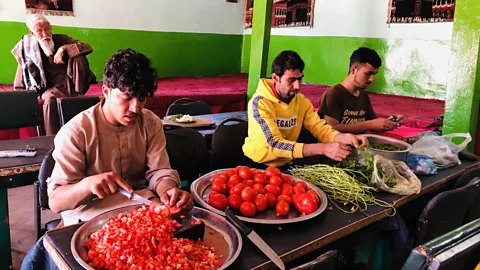 Kanika Gupta
Kanika GuptaAt Bacha Broot, the day starts long before the sun rises. "We start the process of cutting the meat at 03:00 and distribute it in all the teapots," Wahidullah said. "We put 200g of lamb meat, tomatoes, onions, split peas and dash of our secret spice mix," he said, referring to the special blend of spices that has been a closely guarded family recipe for more than seven decades. He then places the teapots in a tandoor oven where the individual stews slow cook for five hours, and then keeps them hot on the coal-warmed counter. "I work from 03:00 till 21:00; it is very tiring work," he said.
The restaurant serves up to 100 guests each day in a cramped space that's neatly divided into two rooms – one for men and one for women. When I visited in March 2021, the men's room echoed with boisterous conversations covering everything from daily life to politics, and a tiny television blared news and traditional Afghan songs. The women's section was at the far end of the restaurant, separated by the kitchen and a purdah, a thin veil. In this quieter, emptier area, a few women sat cross-legged on a raised platform covered in worn carpet, engrossed in intimate conversations.
In line with Sharia brought on by the Taliban rule, Bacha Broot now plays nasheed (a permissible form of vocal music) instead of news and songs, and still caters to women, provided they are accompanied by their mahrams (male chaperones).
My chainaki was served in a smouldering hot teapot alongside a bowl and naan. To eat it the traditional way, I tore off pieces of naan and put them in the bottom of the bowl then poured the chainaki over the top. The aroma of the long-cooked spices and the rich scent of lamb drifted up, prompting me to eat so quickly that the naan didn't have the chance to grow soggy. Saberi notes that the naan, which absorbs all the flavours of the stew, can be scooped up by hand or with a spoon.
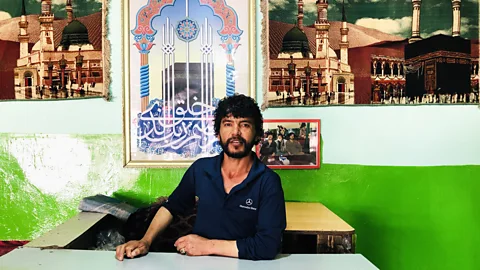 Kanika Gupta
Kanika GuptaServing this comfort food sometimes came at great personal risk for the Bacha Broot family. Wahidullah started working with his father as a child, and even during the Mujahideen wars, the Taliban reign and relentless rocket attacks, they never stopped serving the stew. Wahidullah and his father worked even when the war raged on just outside their doors.
"Some days we prepared chainaki even when they were firing rockets outside," Wahidullah said. Once, "a rocket lodged itself behind our restaurant, but it never exploded. It was a narrow escape for us that day. But then we came next day and resumed our work."
Wahidullah is determined to keep his doors open. "I want to continue selling chainaki because I want my father's legacy to live on. He worked really hard throughout his life to keep this place running," he said. "I love that all kinds of people come to my restaurant for eating chainaki. I want to continue serving them."
True to its commitment to serve its loyal patrons, they continued to serve their delicious chainaki even after the Taliban's takeover on 15 August 2021. "We are fortunate that our business remained unchanged following last year's events," said Faridoon, Wahidullah's brother.
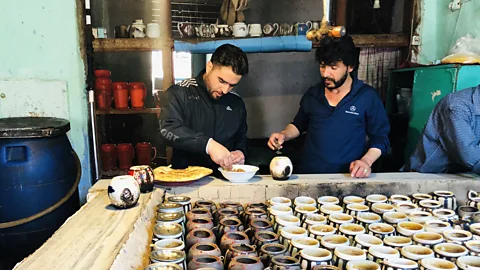 Kanika Gupta
Kanika GuptaDespite years of insecurity, Wahidullah remains optimistic that one day there will be peace and he will be able to run his business without worry. He hopes to eventually pass this legacy on to his children, who can continue to offer this traditional Afghan food.
"Years of war not only killed people but also these traditional recipes. There are very few Afghans who still know how to make authentic chainaki," said Wahidullah. "I want chainaki to become Afghanistan's ultimate comfort food."
---
Join more than three million BBC Travel fans by liking us on Facebook, or follow us on Twitter and Instagram.
If you liked this story, sign up for the weekly bbc.com features newsletter called "The Essential List". A handpicked selection of stories from BBC Future, Culture, Worklife and Travel, delivered to your inbox every Friday.
